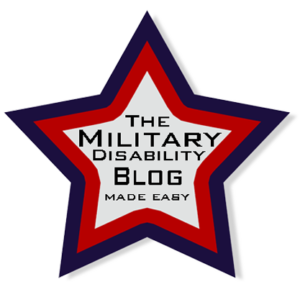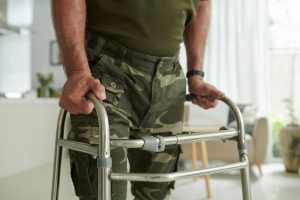Higher VA Appeals
- Published:
- Last Updated: October 4, 2022

If you disagree with your Rating Decision for VA Disability, you can submit appeals to have your VA Disability Rating increased.
There are multiple levels of appeals, and each level must be completed in order. We thoroughly discuss the first 2 levels in our discussion of VA Appeals on our site. Level 1 is the Board of Veterans’ Appeals, and level 2 is the US Court of Appeals for Veterans Claims. These two levels are appeals that occur within the VA system itself. After you’ve completed level two, if you are still unhappy, you can appeal to a federal court.
Below are the two levels of VA appeals to federal courts that you can pursue and what you need to do to submit an appeal. We do NOT, however, recommend appealing to a federal court without some form of legal representation.
Level 3.
Level 3 of VA appeals is the US Court of Appeals for the Federal Circuit. You cannot appeal to this court for just anything, however.
The US Court of Appeals for the Federal Circuit will only review your case IF:
– There is a disagreement about the interpretation of the law. Much of the VASRD is left up to interpretation, but if you disagree with something that is clearly a fact, not an interpretation, your case will get thrown out of this court.
– You feel that the US Court of Appeals for Veterans Claims made a decision contrary to the laws that it is required to follow.
– There is evidence that a law that was used to determine the US Court of Appeals for Veterans Claims’ decision conflicts with other laws that would give your case a better outcome. Sometimes there are laws that override other laws in certain instances, but these cannot be contested. There can be nothing in the laws themselves that can logically decide which law should be dominant in your case for this argument to proceed.
If you submit an appeal for any other reason, the Federal Circuit court could fine you for filing a frivolous petition. Just be careful and make sure your argument is sound. This is where having legal representation could really help.
Remember that if you have new evidence, you have to start over at the local VA. You cannot submit new evidence to this court, or your case will be thrown out.
To apply to the US Court of Appeals for the Federal Circuit, you must submit your appeal within 30 days of the official judgment of the US Court of Appeals for Veterans Claims. If it is not received within 30 days, it will be thrown out.
To apply to the US Court of Appeals for the Federal Circuit, you actually submit a Notice of Appeal to the US Court of Appeals for Veterans Claims. For some reason, all appeals to the Federal Circuit court are processed through the Veterans Claims court instead of being sent directly to the Federal Circuit court.
In addition to the Notice of Appeal, include a copy of the United States Court of Appeals for Veterans Claims’ decision. You could also include an Information Sheet, but it is not required. Not a bad idea to include it, though.
The Federal Circuit court charges $450 to file an appeal, but since it is processed by the US Court of Appeals for Veterans Claims, the payment is made out to them. It can either be paid by check or money order to the U.S. Court of Appeals for Veterans Claims. If you honestly can’t afford to pay the fee, you can file a Forma Pauperis form instead.
The Federal Circuit court also required for you to submit an Informal Brief. This is where you state your issues and argue your case. This must be submitted within 21 days of your case being served, and it cannot exceed 30 pages in length.
The US Court of Appeals for the Federal Circuit provides a Guide for Pro Se Petitioners and Appellants that contains further detailed information about applying to this court, writing an Informal Brief, and what to expect after you submit your appeal.
Now after you receive the Federal Circuit court’s decision, and you’re still not happy, you can file a petition for rehearing, but you’re case will most likely not be reopened. They rarely will reconsider a case. After submitting a petition for rehearing, you can move on to Level 4.
Level 4.
This is it. The last level: The US Supreme Court. Can’t get any higher than that.
After you’ve received your ruling from the Federal Circuit, you can appeal to the Supreme Court.
The Supreme Court only hears 1% of all cases that are filed, so it is most likely that your case may never be heard. The Supreme Court only considers cases where:
– Two lower courts have made completely different rulings on the exact same issue. The issue must be important enough that it would affect many people for the Supreme Court to deem it worthy.
– The issue involved is extremely important to the public and would affect a lot of people.
If your case doesn’t definitely fit one of these categories, then don’t waste your time submitting an appeal.
If your case does, and you wish to proceed, then you must submit a Writ of Certiorari within 90 days of the final judgment of the Federal Circuit court. Full directions and all the necessary forms can be found in the Guide For Prospective Indigent Petitioners For Writs of Certiorari.
Recent Posts
TDRL vs. PDRL—Which is better for disability benefits?
February 13, 2025
Leukemias and Multiple Myelomas NOW on the Presumptive List
January 9, 2025
Two MORE Conditions added to the Burn Pit Presumptive List
January 3, 2025
The 2025 VA Disability Rates are here!
December 2, 2024
About Us










23 Comments
This is what the C&P examiner wrote about my claim for non combat PTSD: Although his claimed condition is PTSD, it appears that bipolar I disorder and delusional disorder, persecutory type is a more appropriate diagnosis.
My question to you Dr. Johnson is can I submit a claim for bipolar and delusional disorder since the VA denied my PTSD claim? If so do you think that it would be approved since the psychologist said I have a disability? Also I was awarded 30% disability for IBS. I read in my research that most veterans with PTSD also have IBS!
NOTE:The VA doctor that I have been seeing for over a year in a half said that I have non combat PTSD.
IBS is not proof of your PTSD, so that won't be beneficial.
PTSD is a tricky condition since the VA has different diagnostic criteria than the rest of the mental health field. With the examiner stating it isn't PTSD, it seems that yours doesn't fit the VA's full criteria for disability purposes, even though your other physician does say it's PTSD.
Where you diagnosed with any mental health conditions while in the military? If so, what? If not, how long after separation did you start to see a mental health professional? What was the official diagnosis?
Claiming bipolar and delusional disorder may work, but it depends on the timeline and diagnoses.
Thank you Dr. Johnson for your prompt reply.
I was not diagnosed with any mental illness while in the military but the NCO chief of the Field maintenance squadron thought that I had a mental problem and removed me from the flight line for wearing jewelry while performing maintenance on the aircraft.
I had to go to counseling to determine my fitness to work on the aircraft.
When I was discharged from the service in December 1974 I went to the VA for help but was told that they could not treat me because I was not service connected so I did not do anything but believed what the VA told me.
I went around for decades without any treatment or help until I reach the end of my ropes and went to the VA in Corona for help.
The VA psychiatrist said that I have noncombat PTSD and the VA therapist said that I have an anxiety disorder.
It took me over 41 years to get any help and to put in any claims with the VA.
NOTE: Although I used it as one of my stressors in my initial PTSD claims, I had a severe anxiety attack and nearly died during PC training field in basis training.
Even though it is noncombat PTSD, is it service-connected? Meaning did the main stressors occur during your time in the military? PTSD, especially noncombat, must have very specific occurrences that trigger it. If those traumatic experiences were all related to your time in the military, then it should qualify. If not, then it probably won't, even with the anxiety attack during training.
A single anxiety attack isn't, unfortunately, evidence of an anxiety condition. There have to be multiple recorded incidents for them to point to a mental health condition. If that is the only recorded evidence of mental health issues while in the service and you can't identify traumatic occurrences while in service, it will be incredibly difficult for you to win this battle.
Thank you Dr. Johnson for your reply!
I did have other stressors such as almost getting cut in half by a landing gear door as I just was able to reinstall the safety pin while performing a post flight inspection and the aircraft crew chief did not see me working in the main gear landing gear bay area and he turned on external power and I felt the landing gear doors trying to close on the bottom of my legs just as I put in the safety pin back in.
To this day I keep having flash backs of that traumatic day and thinking had I survived that incident I would be a quadriplegic and be handicapped for the rest of my life.
Also flying on an aircraft during base orientation in which the landing gear would not deploy that scared the daylights out of me.
The VA said I cannot use the landing gear would not deploy because they were able to land the plane by using a hand gear om the plane after tearing up the floor and working very hard to manually lower the landing gear.
I do not fly today for that reason and have bad nightmares of planes crashing all the time.
Also an fellow airman who flew to basic training with me from California went into the latrine last one night on the 8th day of training and burst his head wide open because his girlfriend who I saw at the airport with him sent him a dear john letter.
That also affected me and still do to this very day!
Why am I still remembering these events this many years later?
When I got to my permanent duty station after tech school my fiancé got married on me why we supposed to have been engaged and I never have recovered from it even though I have been married four times.
Because I did not get physically injured does not mean that I was not affected mentally and psychologically.
You have a tough case. But here is the bottom line:
Even though you have triggers for PTSD that occurred while in service, you must meet the requirements for the VA's diagnosis of PTSD, which is more strict than other diagnosis requirements for PTSD. These include symptoms that you may or may not have. You can find them on our PTSD page.
http://www.militarydisabilitymadeeasy.com/ptsd.html
If you find that you do meet all the requirements, then that is your basis for appeal. If not, then you won't qualify for PTSD.
The issue with applying for any other mental health condition is that it must have been diagnosed while in service. PTSD is the only mental health condition that can qualify for service-connection years after separation. All others must be diagnosed within 1 year of separation.
That you Dr. Johnson for taking the time to read and reply to my messages. You always give out great advice!
After reading through the requirements for PTSD, I meet nearly all of the listed characteristics for having PTSD and the VA psychiatrist who diagnosed me got it right! My current wife can testify that I meet the listed requirements for PTSD
Since you meet all the requirements, you can definitely submit an appeal, and you should be successful. Make sure to emphasize that your dominant triggers are all occurred while you were in service.
Thank you Dr. Johnson. I will definitely emphasize the dominant PTSD triggers that occurred while I was still in the service. Have a great week sir!
I am currently getting 30% disability for IBS and seeked an increased by linking by GERD as a secondary condition to IBS. I asked my primary VA doctor for a statement saying that my IBS more than likely has caused by Gerd condition. This is the reply that I received:
Good afternoon,
Per Dr. Williams:
This office does not provide compensation and pension services. Any
statement made to link conditions would be based on speculation
only.
/es/ ANGELA C. WILLIAMS, MD
PHYSICIAN
Thank you and have a great day!
Jennifer Brown, LVN
I have a problem when a C&P doctor is seeing you for the first time and your primary care doctor is treating you for the condition! Something is disconnected here! What is your input on this issue
/
Your doctor that treats the conditions is the correct source for a NEXUS statement like this, so it is really unfortunate that she is unwilling to write one. A NEXUS can be written be any physician. All they need is the medical knowledge and experience to be able to state that conditions are related.
Now of course, it is every physician's prerogative to be helpful or not. So it's unfortunate yours isn't willing to help.
Your only other recourse is to go to another physician. A specialist's opinion is always more powerful, so seeing a gastroenterologist may be beneficial.
Now if you are unable to get another physician to write one because of "speculation", then the evidence may actually suggest that the conditions are not actually related. I can't speak to this definitively, but that could be a reason your doctor wouldn't write it.
Thank you Doctor Johnson for your honest opinion. I will make an appointment with my private health care gastroenterologist doctor about my current condition and will keep you posted as to what transpires.
Hello Doctor Johnson, Today 3-24-2017 I received a notification from QTC to have two C&P exams on 3-30-2017.
I need some help in answering the questions.
Remember I had the IBS condition for over 40 years and recently filed a claim for GERD as secondary to IBS.
In my opinion for VA purposes I cannot say that I had the GERD before I had the IBS because it is secondary to IBS.
Condition: GASTROESOPHAGEAL REFLUX DISEASE
DBQ Required: Esophageal Conditions)
Date of onset of the symptoms:
(NOTE: the IBS started in 1973)
Where and how did the symptoms begin?
(NOTE The symptoms started in basic training and continues to this very day only it is much worse today even with all of the medications that I am on.)
Describe in detail the course of the conditions:
(has it gotten better, worse, or stayed the same?)
(NOTE It is much worse today even with all of the medications that I am on.)
ADDITIONAL HISTORY
Does the Claimant’s treatment plan include taking continuous medication for the esophageal condition(s) below:
No Yes.
List only those medications used for the esophageal condition(s) Below:
Not exactly sure what you are looking for from me. Just answer these questions honestly as you expressed them to me, and you'll be fine. Since it is secondary, I recommend listing the onset and symptoms of both IBS and GERD so that they get an entire picture of both conditions and their relationship.
Thank you doctor! I just wanted your opinion and you gave me what I was asking. Your advice and information is invaluable and worthy!God Bless you and may God Bless America!
Hello Dr. Johnson, when I went for my C&P Exam for GERD, The doctor conducting the C&P exam stated that he was going to help me out and he said that he had reviewed all of my records and said that I have the IBS and the GERD conditions. I received my results back that said it is not service connected. What could have gone wrong when a C&P doctor says one thing and the VA says something else? I am puzzled and troubled. I will not elaborate until I get a chance to review my C-File and see exactly what the C&P doctor wrote in his narrative report!
The Rating Authorities don't always agree with the physician when looking at all the evidence. It could also be that the physician didn't provide enough proof of his opinion as well to enable to the VA to make a solid connection between the two conditions.
Thank you Dr. Johnson for your honest and knowledgeable opinion. I feel so much better hearing what you have to say about it. Hopefully the doctor wrote favorably about my condition. If my private doctor also says something to support my condition it will strengthen my appeal process by pushing the scales more in my favor than being one sided.
7-17-2017
Hello Dr. Johnson, it has been a while since I last wrote you. I just foumd out that the C&P doctor told me a big lie. He is a very sneaky and deceitful person. He had told me that he would take care of me and wrote a very negative report about me. Your VA Examiner Opined, "The claimed condition is less likely than not (less than 50 percent probability) proximately due to or the result of the veteran's service connected condition. I reviewed medical records which show that veteran was seen for abdominal issues and was diagnosed as possible GERD vs IBS. Based on medical literature from uptodate.com, these are the usual causes of GERD: 1. Transient lower esophageal sphincter relaxations 2. Hypotensive lower esophageal sphincter 3. Hiatal hernia and the diaphragmatic sphincter 4. Obesity 5. Pregnancy and exogenous estrogen.
Based on this evidence and my exam of the claimant today, I believe that the claimant's GERD condition is less likely than not related to Irritable bowel syndrome.
I'm sorry to hear about this. Medically, the connection between IBS and GERD is not very strong. They can often occur together in patients, but that doesn't mean that one causes the other, which is the key. They just are similar. There are some studies that say they are connected, but if you dig into them, they really just say that they are similar, not that they are caused by one or the other. That's the real issue here.
Had your doc opined that the IBS caused the GERD, your claim probably would have been successful, but it looks as though he's going to interpret the studies as I noted above, which doesn't help your case at all. With the lack of medical evidence that clearly states that IBS can cause GERD, you probably won't be successful with an appeal.
What if my private doctor opned that it does? Because one doctor says something does not make it right. I read in the board of veterans appeals that a case similar to mine won on appeal.
Thanks doctor for your comments. Why am I taking omeprazole for my IBS? Omeprazole is for acid reflux!
The question is not whether or not you have GERD, it is whether or not it is caused by IBS. You clearly have GERD, no question about the diagnosis. The issue is whether or not it can be considered service-connected.
If you submit a letter from your private doc stating that it the GERD is "more likely than not" caused by the IBS, that will strengthen your case.